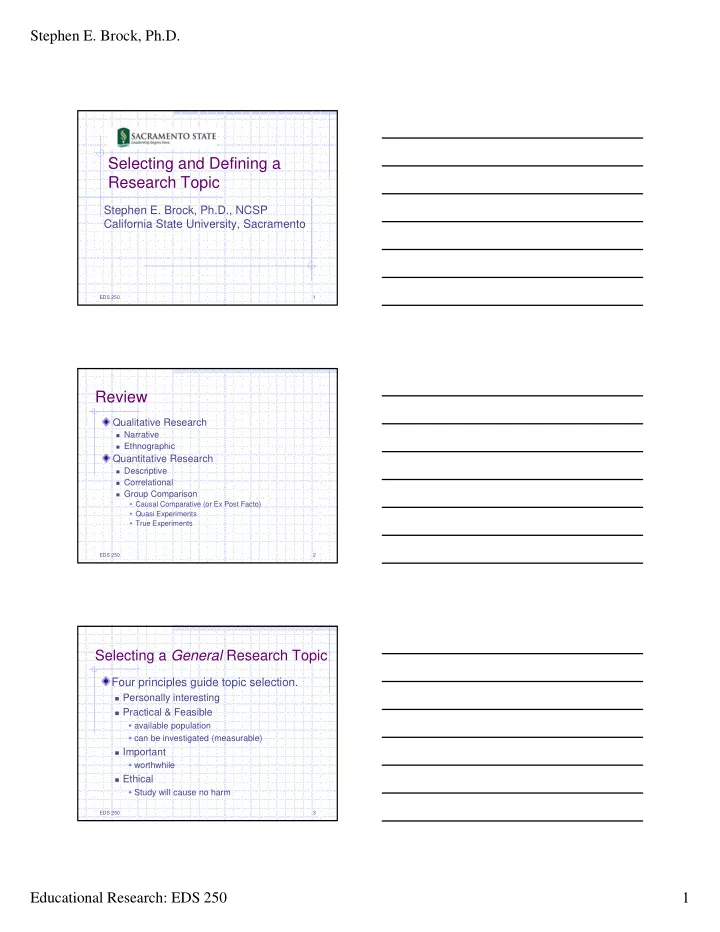

Stephen E. Brock, Ph.D. Selecting and Defining a Research Topic Stephen E. Brock, Ph.D., NCSP California State University, Sacramento EDS 250 1 Review Qualitative Research Narrative Ethnographic Quantitative Research Descriptive Correlational Group Comparison Causal Comparative (or Ex Post Facto) Quasi Experiments True Experiments EDS 250 2 Selecting a General Research Topic Four principles guide topic selection. Personally interesting Practical & Feasible available population can be investigated (measurable) Important worthwhile Ethical Study will cause no harm EDS 250 3 Educational Research: EDS 250 1
Stephen E. Brock, Ph.D. Selecting a General Research Topic Identify an area of interest (Personal). ADHD brought with me to UCD Identify an available population and/or setting for study(Practical). ADHD and elementary children (work in K-6 schools) Consider an issue(s) related to the area of interest that can be studied (Feasible). ADHD and academic achievement (lots of measures of achievement, lots of study in this area) Identify a worthwhile research question (Importance). Reading comprehension of ADHD children (no prior study) Make certain the conducting the study will not harm anyone (Ethical) study would provide useful data to participants and would not harm EDS 250 4 Portfolio Assignment #1 What are your research interests? Identify others who share your interests. Use the just discussed 4 guiding principles and apply them to your own areas of research interest. 1. How is the area personally interesting? 2. Is the area practical and feasible to study? 3. Is the area important to study? 4. Is it ethical to conduct study in this area? EDS 250 5 Sources of Specific Research Ideas Theory (e.g., Skinner or Piaget) Replication Research Discussions Future research Textbooks Literature reviews Course work Colleagues Listserves Personal/Professional experiences & observations EDS 250 6 Educational Research: EDS 250 2
Stephen E. Brock, Ph.D. Selecting a Topic, Narrowing, and Stating a Research Question 1. Personal + Practical/Feasible + Important + Ethical = A good topic! 2. Narrowing the topic down is especially important for quantitative research. Consult with advisors Review textbooks 3. State the Research Question Describe the population of interest Describe variables Describe relationships among them EDS 250 7 Purposes of the Literature Review Provide essential background knowledge. The “textbook” for your research question. Identifies what has already been done. Clarifies what is already known. Justifies the research effort. Why is the study needed? Identify prior research mistakes. Provides study rationale Facilitates interpretation of the results. EDS 250 8 Content of a Literature Review An Example: ADHD & Reading Comprehension Provides an overview of the background or context within which the research exists. Conceptualizations of ADHD A Brief History of ADHD The Current Conceptualization of ADHD A Conceptualization of Reading Comprehension Note: would be much briefer in a journal. Identifies the importance of the research questions. Justifies the research effort. Provides a documented, logical rationale for hypotheses. Origins of the Research Question How ADHD May Effect Reading Comprehension EDS 250 9 Educational Research: EDS 250 3
Stephen E. Brock, Ph.D. Activity State a research question. Identify important background knowledge. How might the literature be used to justify the research effort? EDS 250 10 Conducting a Literature Review Searching for books Become familiar with library resources. Know how to use a variety of databases. Begin with a broad review (secondary sources). Start with seminal works, textbooks, handbooks, encyclopedias, review articles, etc. Progressively narrow down the reference search and begin to review primary sources. Avoid the temptation to include everything. BE SYSTEMATIC AND ORGANIZED!!! EDS 250 11 Computer Searches* Identify keywords Know how to read abstracts and how to locate documents. *Caution: The inclusion Identify Relevant Databases criteria in some databases is not very rigorous (if present Commonly used Databases at all). Give information ERIC from a peer reviewed journal PsycINFO more weight. This is not to say that “junk” does not Dissertation Abstracts sometimes find its way into The Internet journals. Books often http://www.google.com include what sells. https://www.youtube.com/watch?v=v_CgPsGY5Mw EDS 250 12 Educational Research: EDS 250 4
Stephen E. Brock, Ph.D. Using Databases Identify Keywords Identify Relevant Databases Commonly used Databases PsycINFO ERIC http://library.csus.edu/ EDS 250 13 Using Databases EDS 250 14 Using Databases EDS 250 15 Educational Research: EDS 250 5
Stephen E. Brock, Ph.D. Using Databases www.csus.edu EDS 250 16 Organizing the Results of the Literature Review Locate the article Scan it to determine relevance Copy/Save the article (if relevant) Read the article Code the article Make notes on how it will be useful EDS 250 17 Writing the Literature Review Develop an outline Appreciate it may take some time to get to this point Determine how the identified sources fit into the outline Organize parts into a meaningful whole Develop the reference list EDS 250 18 Educational Research: EDS 250 6
Stephen E. Brock, Ph.D. Summary • The literature review should parallel the research development process. It begins with a broad focus (providing the reader with essential background knowledge) and concludes with a narrow focus (presents and justifies a specific research question or hypothesis). EDS 250 19 Next Meeting Preliminary Research Design Read Educational Research, Ch 4 & 5 Portfolio Activity 2: Develop preliminary hypotheses Template available: http://www.csus.edu/indiv/b/brocks/courses/e ds%20250/eds%20250/student_materials.ht m EDS 250 20 Educational Research: EDS 250 7
Recommend
More recommend